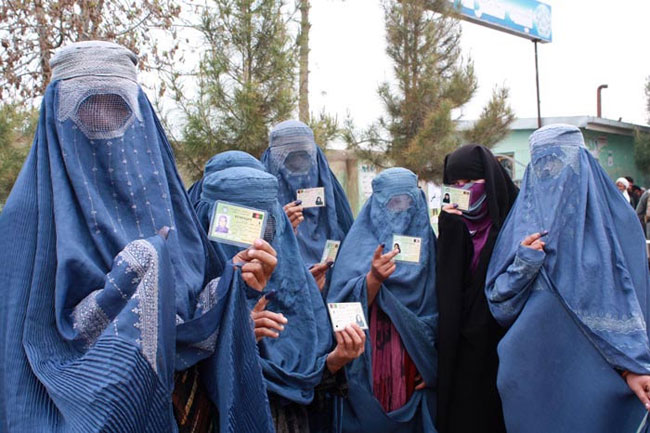Afghanistan is set to participate in the first democratic elections in decades.
While the West wants to ensure that Afghanistan does not slide back to chaos and anarchy, the Taliban has vowed to disrupt the key April 5 elections with rocket-propelled grenades and gunfire.
The effort to disrupt the Afghan presidential elections has begun. Recently, the militant group has claimed responsibility for a series of bloody attacks across the country.
The Taliban, in a statement, has called on fighters to carry out attacks on electoral workers and official involving in next month’s presidential election, according to reports.
Saturday’s attack on the election headquarters in Kabul was an audacious attempt to instil fear and hit hard at the most visible symbol of democracy—elections.
It was the second attack on electoral offices this week apart from the attack on Independent Election Commission (IEC) office in Kabul on Tuesday. The Taliban claimed responsibility for all the attacks.
Apart from targeting election symbols, Kabul alone suffered an attack on a posh hotel and a guest house meant for foreign aid workers, killing more than a dozen people.
Reportedly, the Taliban has targeted every election after the group was thrown out from power in 2001.
In the early 2000, the Taliban controlled most of Afghanistan, but its rule was not recognized by the international community.
After Sept. 11, 2001 attack on the World Trade Centre, The US and allied forces ousted the Taliban and al-Qaida from power.
The Taliban apparently has grown bolder as US and NATO forces prepare to withdraw this year and President Hamid Karzai steps down after 12 years in power.
The increased attack and intimidation of Afghan civilians and officials is reportedly an effort to change perceptions at a time when the Taliban is failing to exert its influence over the Afghan government forces, which took over security from the International Security Assistance Force (ISAF) last year.
“Many worry that the attacks will deter voters from casting their ballots. Already several hundred polling stations have been shut down,” Voice of America reported.
Despite the barrage of gunfire and rocket-propelled grenades to wean voters away, many are optimistic about the future.
The Guardian quoted 30-year-old mechanic Rahimaullah saying, “We have to select a new president, so we have someone to stop the suicide attackers. The people will vote and do their job.”
Amid the Taliban threats to directly target anyone who participate in elections, the optimism is already apparent at voter registration centres with Afghans queuing to secure voter identity cards.
“Kabul is in a heightened state of security after a string of attacks directed by the Taliban against foreigners and election officials, with the whole country braced for more violence in the run-up to elections on April 5,” the Telegraph reported.
Reportedly, the successful conduct of elections is closely tied to the possibility of smaller NATO and US troop to remain in the country to train the Afghan National Army and conduct counter-terrorism operations.
The implementation of Bilateral Security Agreement would funnel financial aid to Kabul, as most of the military operations now are paid by Western countries.
Many Afghans see better governance and stability as vital to get continued Western support as Afghanistan negotiates its first democratic transition since the US military evicted the Taliban from power.
Given the messy and complicated history of Afghan politics, no one can predict an easy road ahead. But the renewed enthusiasm speaks of an expanding interest among Afghans to find an alternative to three-decades plus of war, violence and instability.
Abdul Kuddus is a Delhi based passionate blogger and works at Tata Consultancy Services. He is a learning solutions consultant by profession and has been writing for different websites.

